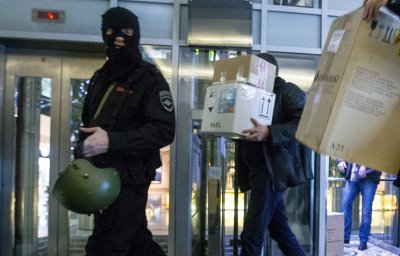
Translator’s Note: The following text is an approximate translation of an article published by Pravo.ru on 20 April 2018. The original author is Alexei Malakhovskiy.- Allen Maggard
At the end of 2015, Vladimir Putin, appearing before the Federal Assembly, emphasized that excessive activity by law enforcement organs was disrupting the business climate in Russia. The president noted that only 15% of criminal cases concerning economic offenses in Russia result in sentencing. At the same time, 83% of entrepreneurs subjected to criminal proceedings – an absolute majority – totally or partially lost their business. Said Putin: “That is, they were ‘pressed,’ ‘robbed,’ and released.”
Notaries in the Isolation Unit and Fines instead of Sentences
In order to change this situation and come up with additional guarantees for guaranteeing the rights of businessmen, Putin at the start of 2016 ordered the creation of a working group to monitor and analyze law enforcement practices in the sphere of entrepreneurship. This group included representatives of the presidential administration and security agencies, as well as the heads of four leading business organizations: the Russian Union of Industrialists and Entrepreneurs (RSPP), Delovaya Rossiya, Opora Rossii, and the Chamber of Commerce and Industry of the Russian Federation. To help businesspeople, the new organ drafted a series of amendments to the Criminal Code and the Criminal Procedure Code, which the president signed in the summer of 2016. These amendments included the following measures:
- Handing down fines instead of criminal punishment. Businessmen who commit an economic crime for the first time are freed from criminal punishment if they compensate for damages to the federal budget. The list of formulations whereby such leniency may be extended to entrepreneurs is sufficiently wide and stretches from limiting competition and market manipulation to deliberate or fictitious bankruptcy. The volume of reimbursement will be calculated either at two times the sum of the damage or as two times the sum of the expense incurred as a result of the crime. Previously, such rates were calculated on a fivefold basis.
- Increasing the amount of damage that qualifies as an “economic” crime. The definition of significant damage was increased from RUB 1.5 million to RUB 2.25 million, while especially significant damage was revised from RUB 6 million to RUB 9 million.
- Raising the minimum threshold for initiating a criminal case concerning the non-payment of taxes. The sum of unpaid taxes that would trigger a criminal investigation against an entrepreneur was raised from RUB 2 million to RUB 5 million.
- Allowing notaries to visit entrepreneurs held in isolation units. Arrested businessmen are allowed to invite their notaries to visit them in isolation in order to formalize power of attorney for controlling their business interests. Businessmen are allowed to meet their notaries free of restriction with regards to the duration or frequency thereof.
The next assignment was to develop measures for increasing the liability of security officials for unreasonably persecuting businesses. In the autumn of 2016, experts drafted a corresponding bill, which deputies adopted in December of the same year. The document introduced amendments to Article 299 of the Criminal Codex, which concerns the illegal initiation of criminal cases. The maximum period of imprisonment for individuals found guilty of Article 299 offenses was raised from five years to seven years. Furthermore, the amendments classify the unlawful initiation of criminal cases for the purpose of obstructing entrepreneurial activity and the collapse of business due to criminal persecution initiated by investigators for mercenary purposes or personal interest as aggravating circumstances. The punishment for such offenses on the part of law enforcement was raised from five to ten years’ imprisonment.
At the same time, the Supreme Court also provided significant guidance concerning “economic” crimes. The Supreme Court told investigative organs and courts how to distinguish fraudulent entrepreneurial activity from typical business practice. Besides that, the document defended businesspeople from the requalification of “commercial” crimes as “simple” fraud, a technique that law enforcement has used to deprive businesspeople of various legal guarantees and led investigations to “pressure” entrepreneurs.
The enumerated changes were already paying off by the beginning of 2017. Speaking at the Russian Investment Forum in Sochi in February 2017, Presidential Commissioner for Entrepreneurs’ Rights Boris Titov said that the number of criminal cases in Russia initiated against entrepreneurs was beginning to gradually diminish. He pointed out that the number of people being held in isolation for economic offenses also decreased by 23% during the second half of 2016. Yuriy Chaika also noted a positive tendency for businessmen in January 2017: in his words, the number of persons sentenced for economic crimes in Russia contracted fourfold over the past five years.
A Proposal from the Supreme Court
The Supreme Court furthered the policy of liberalizing criminal legislation regarding economic offenses in the autumn of 2017. The plenum of the Supreme Court developed a draft law to assist businesspeople held in custody without cause for an extended period. The current version of the Criminal Procedural Code generally prohibits such preventative measures for economic crimes. In practice, however, investigators reclassify “entrepreneurial” offenses as “general” offenses so as to bypass this, sometimes with agreement from the courts. In order to prevent such “cunning,” the Supreme Court suggested concretizing the recognition of crimes committed in the sphere of economic activity.
The Supreme Court’s Definition of Economic Crimes: “Crimes in the sphere of economic activity are committed by individual entrepreneurs in connection to their implementation of entrepreneurial activity and/or their control of assets for use in entrepreneurial activity, whether as a managing member exercising control of a commercial organization or in connection to the commercial organization’s implementation of entrepreneurial or other economic activities.” (Link)
The Supreme Court’s bill was also designed to break the tendency of suspected and accused persons being held in isolation for months and years on end without specific cause while investigators do not perform active work on their case. In order to extend the period of detention, investigators not only must specify the motives for doing so but must also detail the concrete investigative actions they want to perform. Law enforcement officers will have to report why they did not implement these actions earlier. The State Duma adopted the abovementioned amendments in the first reading.
However, at the start of 2018, experts asserted that the number of criminal cases initiated against entrepreneurs was still climbing. This is evidenced by statistics collected in the report “Criminal Persecution for Economic Matters-2017,” which was prepared by Titov’s team of experts. Even so, the report indicates that less than 20% of such cases end up reaching court. These figures are based on the results of monitoring court practices and the data of the Federal Penitentiary Service of the Ministry of Internal Affairs. The report emphasizes not only the growth of “fraudulent” investigations but also a new tendency wherein more and more businessmen are being subjected to criminal persecution for non-payment of wages (Article 145.1 of the Criminal Codex). Experts consider these cases as a means of pressuring businesses, as sentences for similar crimes are carried out in only 15% of such instances.
Why Liberalization is not Giving Tangible Results
The abovementioned legislative changes have not led to anything in practice, believes criminal law specialist Valery Volokh. According to Volokh, the courts continue to place entrepreneurs under detention, investigators continue to keep objects and documents for several months without recognizing them as material evidence in a timely manner, and law enforcement officers continue to deny detained businessmen from meeting with notaries without reason. Matvey Protasov of Moscow law firm Romanov and Partners explains that the entire liberalization campaign has one major problem: “There is no correlation between the letter of the law and the practice of the law.” Unfortunately, says Protasov, neither law enforcement nor the courts care about entrepreneurial activity, even in the most obvious situations: “As before, requests by law enforcement for the approval of detention are being approved based solely on the gravity of the accusations.”
Valeriy Zenchenko, Managing Partner of law firm Pen&Paper: “The norms for liberalizing criminal economic crime statutes exist, but liberal enforcement is not being observed. Who can fix such a situation or, at the very least, correct it? A lawyer who not only knows the new norms but also knows how law enforcement will try to use them, and also understands how to prevent investigators from doing so.”
As an example, Protasov cites the tricks investigators use in prominent cases to send businessmen behind bars: “Rather than implicating a businessman in committing an Article 159 offense (“Fraud”), they point to signs of an Article 210 violation (“Organization of or Participation in a Criminal Group”), which, in 100% of such cases, allows them to place the accused in an isolation unit.” Kirill Belskiy of Koblev and Partners acknowledges that law enforcement officers often employ “terminological foci” to extract concrete cases out from under the category of “entrepreneurial activity.” Agreeing with his colleagues, Alesksey Gurov, who heads the criminal law practice at Barshchevskiy and Partners, provides another example: according to Article 201 of the Criminal Codex (“Abuse of Authority in Commercial Entities and Other Organizations”), the accused may be detained, although the configuration of this same norm recognizes the possibility of such crimes being committed in the sphere of economic activity. Gurov contends that investigators frequently exploit this legal contradiction.
Artem Chekotkov of Knyazyev and Partners sees far deeper causes of the ineffectiveness of the legal institutions being established for the defense of business: “They consist not in the technical disappointments of the same norms, but in the inability to solve these issues through the creation of a specialized regime for assigning criminal liability to particular group of individuals, viz., entrepreneurs.” Chekotkov points out that there is currently no clear justification as to why businessmen specifically should hold privileges vis-a-vis criminal liability in comparison to other citizens. He further adds that ameliorating the fate of entrepreneurs who have committed offenses is not a task for criminal law.
Other Problems Facing Entrepreneurs Confronting Security Officials
In parallel, business remains in search of ways to “optimize” its own profits – and not always by honest means, says lawyer Svetlana Maltseva of Zabeyd and Partners. On the one hand, law enforcement is trying to stop such actions, but on the other hand, Maltseva adds, they often participate in them. When there is a crisis in the country, and the level of money in the budget is insufficient, then business becomes the sole source for replenishing it, explains Maltseva: “Moreover, businessmen themselves do not pay attention to the ways in which various frauds are being revealed and do not switch over to ‘new set of rails,’ instead continuing to engage in old schemes.” In fact, says Sergey Yegorov of law firm EMPP, entrepreneurs are being punished for using illegal schemes from the (relatively) distant past: “We are talking about actions committed 3 to 5 years ago, and older still.”
That is to say, by applying an ambiguous yet seemingly legal scheme today, an entrepreneur risks being implicated in one or another criminal abuse a few years down the line. Yegerov provides a tangible example from the realm of business: “Today, builders understand that it is not worth accepting budgetary money. And if they do, and they ended suddenly before delivering the object, then they must finish the property at their own expense. Otherwise, they run a high risk of being accused of fraud. Such risks were not perceived several years ago.”
Yegorov believes that when it comes to humanizing legislation, it is worth considering the moment when businessmen stop employing ambiguous schemes for their work and voluntarily refuses to use such options in favor of more conscientious and transparent ones. In some cases, suggests Yegorov, such circumstances should be regarded as mitigating or emerging as a condition for halting the criminal persecution of an entrepreneur, “by paying a judicial fine, for example,”
Denis Saushkin, managing partner of law firm ZKS: “If the court closes its eyes to violations of the law, then why should others use it? What is the sense of changing or introducing legal norms if no one will use them? There are no laws that need changing; what is needed is a systematic approach on the part of the court in performing its own functions.”
Belskiy notes another flaw. According to him, dishonest police officers can still exert pressure with impunity on business without initiating a criminal case: “This takes place through pre-investigation checks and ‘operational-investigative activities,’ wherein law enforcement is allowed to obtain testimony from individuals, to execute searches of properties, and to seize objects and documents.” Only a professional lawyer can distinguish such search and seizure actions from an interrogation: “Yet for the businessman, this is one and the same form of pressure, only without the risk of being imprisoned.”
Yet another serious problem in the interactions between business and the law enforcement system, argues Yegorov, is the selectivity of Russian investigators and justice. According to Yegorov, this factor does not allow for the establishment of a unified “rules of the game” for business and law enforcement. Businessmen often feel entrepreneurs fall prey to criminal proceedings simply because of bad luck, says Yegorov: “After all, his competitors are working according to the same rules.” For this reason, Chekotkov believes that a list of organizational and technical measures – not legislative ones – is needed in order to support the implementation of the current legal reforms.
Kirill Belskiy, partner of Koblev and Associates: “It is necessary to clearly establish that criminal charges cannot be deployed in instances of civil violation. So long as this does not happen, it will be possible for economic operations to be labeled as a criminal offense at the behest of interested parties.”
But Belskiy believes that the only real way out of the abovementioned problems is for the courts to restore real control over law enforcement. Returning various supervisory functions to the prosecutor’s office could also have a positive impact on the situation, he suggests.
 Note: This piece originally appeared in the 15 June 2018 edition of the Bear Market Brief newsletter. If you are interested in learning more about Russian political economy – as well as reading my own occasional scribblings on Russian law – then you can sign up – right here – Allen Maggard
Note: This piece originally appeared in the 15 June 2018 edition of the Bear Market Brief newsletter. If you are interested in learning more about Russian political economy – as well as reading my own occasional scribblings on Russian law – then you can sign up – right here – Allen Maggard
